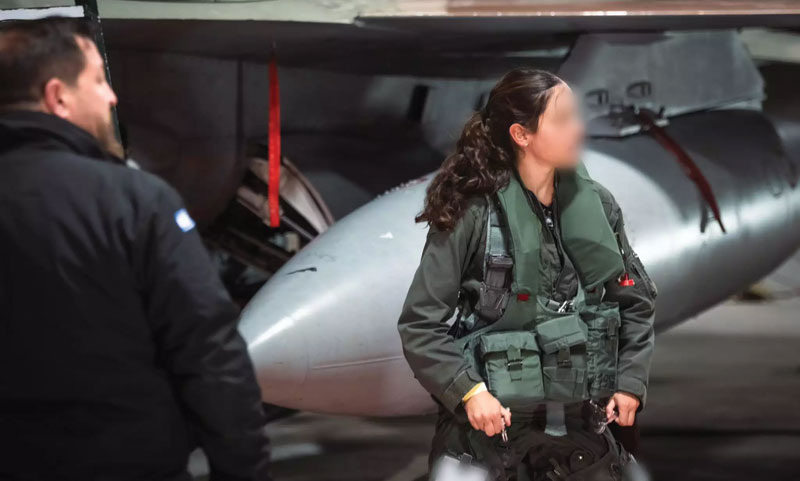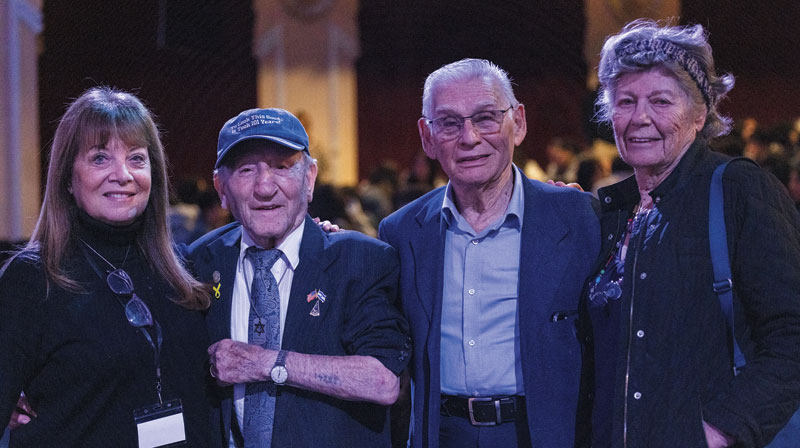
The last time that I, a Jewish female, flew over Iranian airspace, I was escaping the country as a young girl in the late 1980s. If you have watched the concluding airplane scene in the 2012 Oscar-winning film “Argo,” you can imagine that the atmosphere on that airplane I boarded was tense, especially for a Jewish family attempting to clandestinely leave the country.
Is it normal for Jewish females to fly over the Islamic Republic of Iran? As of two weeks ago, yes.
But recently, several Jewish women flew over the country in a different capacity. They were four highly-trained Israeli combat navigators, and along with their male counterparts in the Israel Air Force (IAF), they targeted Iranian sites as part of “Operation Days of Repentance,” which also destroyed three Russian-made S-300 defense systems in Iran (Israel targeted the first S-300 back in April). It was a spectacular reminder that if you invest millions in buying defense systems from Russia, you better ensure that Israel can’t blow them up.
The strikes also targeted Iranian missile production sites. Simply put, after the operation, one particular country in the Middle East is currently operating with its proverbial pants down. Or as Rich Goldberg, a senior advisor at the Foundation for the Defense of Democracies, observed on Dan Senor’s “Call Me Back” podcast last week, “With no air defense, Tehran — the regime — is naked. The Ayatollah has no clothes.”
But that hasn’t stopped Iran from vowing to retaliate harshly against Israeli military targets, although not until after the results of this week’s presidential elections. The regime has said it would wait until after the elections to retaliate against Israel so as not to help Donald Trump win. That says a lot about Iran’s perception of the Democratic Party, but that’s a matter for another column.
For their part, Iranian leaders now find themselves with their evil hands tied. They cannot admit that Israel destroyed so much of their defense systems without admitting their own vulnerability (hence, the nakedness), and that would be especially embarrassing in the eyes of their own population. But they also cannot make the case for striking back at Israel without admitting good reason, and that admission would have to include being honest about how much Israel has damaged their air defense systems.
I asked an official source with the Israeli government to tell me more about “Operation Days of Repentance.” She confirmed that it was a “mission in which a great portion of the IAF was deployed in three waves to strike Iran.” I loved her response when I asked about IAF pilots flying over Iraq and Syria and striking targets there as well. “We don’t get into details about our flight path,” she said.
The photos of those female Israeli navigators (their faces are blurred for their own safety) are incredibly powerful. Israel didn’t always allow female fighter pilots, especially due to fears of what they could endure at the hands of the enemy men who could shoot down their planes.
But the symbolism of this recent operation is indescribable: Instead of forced hijabs like the kind I and millions of other females were forced to wear back in Iran, those Israeli women wore special jet fighters’ helmets. And instead of needing a husband’s permission to travel outside of the country (Iranian women also need their husbands’ permission to get a passport), those female Israeli navigators not only left their country in complete freedom, but in some of the most sophisticated stealth fighters in modern history.
Isn’t that extraordinary?
The pilots who carried out the missions were highly-trained and tasked with vastly intricate responsibilities; with precision, they had to make split-second decisions, isolate targets to practically the nearest millimeter (only five Iranians were killed in the strikes, and they were all army or security guards), and control the aircraft they were utilizing flawlessly. I firmly believe that any Israeli woman who knows how to assess and operate an F-35 Lightning II “Adir” stealth fighter is more qualified to serve as president or prime minister of the country than almost anyone else.
“There’s a sisterhood story in this war,” a female Israeli source who asked to remain anonymous told me. “When we think of these current wars, we think of IDF men entering Gaza. But this is also about women fighting for their country, and for their region. There’s a big women’s story here.” Tragically, that includes the fates of the five female IDF field observers, or “Tatzpaniot,” who were abducted from the Nahal Oz base near the Gaza border and are still being held captive in Gaza. Hamas killed 60 soldiers when it stormed the base on Oct. 7, including 15 unarmed female observers. They hid in their command center and were burned to death.
The women who flew those stealth fighters in Iran two weeks ago not only helped restore deterrence in the Middle East, and they not only helped millions of Iranian women reach another step closer to freedom, equality and the pursuit of basic human rights. They also redeemed the memories of their sisters in uniform who perished on Oct. 7, and those who are still languishing as captives in Gaza.
If Israel has repeatedly stated that it stands with the people of Iran, it is making good on its promise to also include the women of Iran. “As a father of daughters, we are telling the world that women need to fly high in attacking Iran and achieving their goals,” Israel Bachar, Consul General of Israel to the Pacific Southwest, told me. “Free the women of Iran. They can also fly high.”
From one lone country in the Middle East, women are redeeming women. But that redemption comes with terrible heartbreak. Just ask the widows, mothers, daughters, grandmothers and other loved ones of soldiers who have fallen in battle this past year, or those whose hearts will never heal from the loss of a precious loved one on Oct. 7.
Meanwhile, in Iran, all eyes are on the fate of a young woman at Tehran’s Islamic Azad University who, on Nov. 2, was being harassed by police for not wearing her hijab properly. Incredibly, she stripped down to her underwear in protest against the country’s strict modesty laws for women. She was arrested and dragged into a car by the dreaded security forces; they smashed the young woman’s head into a car or pillar and beat her, some students claimed. Now the regime is claiming she undressed in public because she suffers from a mental disorder.
In one country, the air force supplies women with top-of-the-line helmets to protect their heads; in another, misogynists with guns and clubs bash women’s heads in because they are not properly covered. (Remember the 2022 death of Mahsa Amini?)Which practice are university students in Europe and the West indirectly supporting when they violently protest against Israel?
In one country, the air force supplies women with top-of-the-line helmets to protect their heads; in another, misogynists with guns and clubs bash women’s heads in because they are not properly covered. (Remember the 2022 death of Mahsa Amini?)
“In a remarkable demonstration of courage, Israel’s female IDF soldiers proved their capabilities on the battlefield while simultaneously showcasing the state of Israel’s respect and value for women who are entrusted to carry out critical military operations,” my colleague, Lisa Daftari, said. Daftari is a journalist and commentator on the Middle East, terrorism and foreign policy, specializing in Iran. She also hosts the podcast “The Foreign Desk.”
Daftari noted that the reality of women’s rights in Israel “stands in stark contrast to the Islamic Republic that shoots at, rapes, blinds and pours acid on the faces of its brave freedom-fighting women who, if given the opportunity, would stand shoulder to shoulder with their Israeli counterparts, fighting against the radical threats they both face.” And then she made a prediction that, I can only hope, will inspire a new type of protest in support of women on college campuses: “This will be the way forward for the future of the Middle East. Brave women will lead the way.”
Tabby Refael is an award-winning writer, speaker and weekly columnist for The Jewish Journal of Greater Los Angeles. Follow her on X and Instagram @TabbyRefael.























 More news and opinions than at a Shabbat dinner, right in your inbox.
More news and opinions than at a Shabbat dinner, right in your inbox.